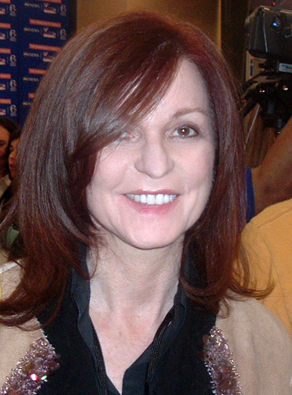Maureen Dowd facts for kids
Quick facts for kids
Maureen Dowd
|
|
|---|---|

Dowd in 2008
|
|
| Born |
Maureen Brigid Dowd
January 14, 1952 Washington, D.C., U.S.
|
| Education | Catholic University of America (B.A.) |
| Occupation | Journalist |
| Years active | 1974–present |
| Employer | The Washington Star (1974–1981) Time (1981–1983) The New York Times (1983–present) |
Maureen Brigid Dowd (born January 14, 1952) is an American journalist and author. She is well-known for writing columns for The New York Times.
Maureen Dowd started her career in the 1970s. She wrote for newspapers and magazines like The Washington Star and Time. She joined The New York Times in 1983. In 1995, she became a writer for their opinion section. She also writes for The New York Times Magazine. In 1999, she won a special award called the Pulitzer Prize for her writing.
Dowd's columns often talk about politics, Hollywood, and topics related to gender. Her writing style is sometimes compared to political cartoons. This means she uses humor and exaggeration to make points about politics and culture. Some people have disagreed with how she wrote about certain public figures.
Contents
Early Life and Career
Maureen Dowd was born in Washington, D.C. She was the youngest of five children. Her mother, Margaret, was a homemaker. Her father, Mike Dowd, was a police inspector. Maureen finished high school in 1969. In 1973, she earned a college degree in English. She studied at the Catholic University of America.
Dowd began her journalism career in 1974. She worked for the Washington Star newspaper. There, she wrote about sports, local news, and other interesting stories. When the Star closed in 1981, she worked for Time magazine. In 1983, Dowd joined The New York Times. She started as a reporter covering city news. By 1986, she was a correspondent in the Times' Washington office.
In 1991, Dowd received a Breakthrough Award from Columbia University. She was also a finalist for the Pulitzer Prize in 1992. This was for her national reporting. In 1994, she won a Matrix Award. This award is from the New York Association for Women in Communications.
New York Times Columnist
Maureen Dowd became a columnist for The New York Times in 1995. She writes for the "op-ed" page. This page features opinion pieces. In 1996, Glamour magazine named her a Woman of the Year. She won the Pulitzer Prize in 1999 for her commentary. In 2000, she won the Damon Runyon Award. This award recognizes great contributions to journalism.
Dowd's columns are known for their strong and often humorous style. She often writes about powerful people, especially politicians. She sometimes uses nicknames for the people she writes about. For example, she has called former President George W. Bush "W." She also called former Vice President Dick Cheney "Big Time." She referred to former President Barack Obama as "Spock" or "Barry."
Some people early in her career thought she focused too much on personalities. They felt she did not focus enough on political ideas. Dowd often uses popular culture in her writing. She uses movies or other trends to help explain her political comments. For example, she once compared the North Korean government to characters in a movie. She said they acted like high school girls who wanted attention.
Her columns are sometimes like political cartoons. They show an exaggerated view of current politics. For example, before the 2000 United States presidential election, she wrote about Democratic candidate Al Gore. She said he was very serious and sometimes a bit self-important. She felt this made it harder for him to share his ideas.
In 2014, Dowd became a staff writer for The New York Times Magazine.
Writing About Public Figures
Maureen Dowd's columns have sometimes caused discussion. Some people have disagreed with her portrayals of female public figures. For example, a study in 2009 noted that Dowd described Sarah Palin as a "Barbie." This was because of Palin's past in beauty pageants.
Other people have said Dowd focused a lot on Hillary Clinton. During the 2008 election, Dowd wrote an article. It asked if Hillary Clinton could "Cry Herself Back to the White House." A study in 2016 said this article might make tears seem like a sign of weakness. Dowd also compared former Senator Clinton to the "Terminator." She described Clinton as someone who would always find a way to keep going. Some argued these descriptions made Clinton's political goals seem unusual.
During the 2016 United States presidential election, Dowd wrote an opinion piece. It was titled "Donald the Dove, Hillary the Hawk." In it, she suggested that Donald Trump had peaceful foreign policy ideas. She mentioned his supposed opposition to the 2003 U.S. invasion of Iraq. However, reports before her article said Trump had supported the invasion. Later, critics of Trump's foreign policy often mentioned Dowd's article. They said Trump's actions did not match what Dowd had written.
In 2020, Dowd wrote a column about Geraldine Ferraro. It first incorrectly stated when a man and woman last ran together on the Democratic ticket. The New York Times later corrected the column. It clarified that 1984 was the last time a male Democratic presidential candidate chose a woman as his running mate.
Personal Life
Maureen Dowd is single. She has dated Aaron Sorkin, who created The West Wing. She was also involved with actor Michael Douglas. Another person she dated was her fellow New York Times columnist John Tierney.
Honors
In 2004, Dowd received the Golden Plate Award. This award is from the American Academy of Achievement.
In 2012, NUI Galway in Ireland gave her an honorary doctorate. This is a special degree.
Besides winning a Pulitzer Prize in 1999, she was also a finalist for the award in 1992. This was for her national reporting.
See also
- New Yorkers in journalism
 | John T. Biggers |
 | Thomas Blackshear |
 | Mark Bradford |
 | Beverly Buchanan |

